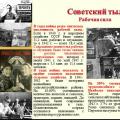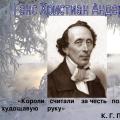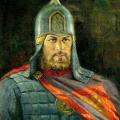Presentation for a lesson on the fairy tale by G.Kh. Andersen's "The Snow Queen"
Literature lesson in 5th grade
based on the fairy tale by H.H. Andersen “The Snow Queen”
Teacher of Russian language and literature Krayushkina I.V.

“Kings considered it an honor to shake his thin hand.”
K. G. Paustovsky


monument
Andersen
in Odense



monument
Andersen
in Copenhagen
"Erected by the Danish people"




Exercise 1 (in worksheets)

Exercise 1.
"...in a large straw hat, painted with wonderful flowers."
THE SNOW QUEEN
“Extraordinarily beautiful, she was all made of ice, made of dazzling sparkling ice! And yet, alive!”
TROLL
“Evil, despicable, absolute devil.”
PRINCE
“...he generally behaved at ease and sweetly.”
GERDA
“Oh, how her poor, tired legs ached!”
PRINCESS
“Clever girl, the likes of which the world has never seen!”
“He sat in one place, pale, motionless, as if lifeless!
LITTLE ROBBERG
“Her eyes were completely black, but somehow sad.”

Evaluation criteria:
0 errors – "5",
1-2 errors – "4"


“This woman, extraordinarily beautiful, was all made of ice, dazzling, sparkling ice! And yet, alive! Her eyes shone like stars, but there was neither warmth nor peace in them!”
(story two)


Homework:
write an essay


Task 2 (for the whole group)
Gerda encounters both obstacles and helpers on her way. Place them in order.
- River
- The old lady who could do magic
- Raven and Crow
- Prince and Princess
- Little robber
- Lapland and Finnish
- The path to the palace of the Snow Queen
- In the halls of the Snow Queen

3 task.

3 task. Please remember which of the characters
helped the girl, and who was at enmity with her?
CHARACTERS WHO HELPED GERDA
CHARACTERS WHO FEUDED WITH GERDA
River
Roses
Raven and Crow
Princess and Prince
Little robber
Pigeons
Deer
Lapland
Finka
The old lady who could do magic
Robbers
Regiment of snow flakes
Eternally howling fierce winds


4 task.
№ ...
episode
“The next day they dressed her from head to toe in silk and velvet and allowed her to stay in the palace as much as she liked. the girl could have lived happily here, but she began to ask to be given a cart with a horse and shoes ... "
“And so she went into the garden, touched all the rose bushes with her stick, and as they stood in bloom, they all went deep, deep into the black earth...”
“The sleigh circled the square twice, and Kai quickly attached his sled to it and rolled off.”
“...but suddenly the mirror became so distorted and trembled that it tore out of their hands, flew to the ground and broke into pieces.”
“Snowflakes were fluttering outside the window: one of them, a very large one, fell on the edge of a flower box and suddenly began to grow.”
“Why are you whining? – he asked Gerda. - Ugh! How ugly you are now! It doesn't hurt me at all! Ugh! - he suddenly shouted. - This rose is being eaten away by a worm. What ugly roses!”

4 task. Place in the correct order
events from the fairy tale "The Snow Queen"
episode
“The next day they dressed her from head to toe in silk and velvet and allowed her to stay in the palace as much as she liked. the girl could have lived happily here, but she began to ask to be given a cart with a horse and shoes ... "
“And so she went into the garden, touched all the rose bushes with her stick, and as they stood in bloom, they all went deep, deep into the black earth...”
“The sleigh circled the square twice, and Kai quickly attached his sled to it and rolled off.”
“...but suddenly the mirror became so distorted and trembled that it tore out of their hands, flew to the ground and broke into pieces.”
“Snowflakes were fluttering outside the window: one of them, a very large one, fell on the edge of a flower box and suddenly began to grow.”
“Why are you whining? – he asked Gerda. - Ugh! How ugly you are now! It doesn't hurt me at all! Ugh! - he suddenly shouted. - This rose is being eaten away by a worm. What ugly roses!”

Evaluation criteria:
0 errors – "5",
1-2 errors – "4"

Task 5.
Before you are pieces of the mosaic.
Collect the puzzle and briefly tell the episode to which it corresponds.



Why did Gerda defeat the Snow Queen?
Puzzle
4.3.6.1 –
10 2.5 8.3.6.9.8,
7.2.10.3.7.7.9.8 11.2.13.4.12.9.8 4.2.14.11.2.15.12.2
1 – a 6 - l 11 – d
2 – e 7 – n 12 – k
3 – and 8 – m 13 – t
4 – from 9 – o 14 – r
5th 10th 15th



Everyone knows the fairy tales of Hans Christian Andersen. And the brave little girl Gerda, who was not afraid of the Snow Queen, and the gentle Eliza, who pricked all her fingers with nettles while she was sewing magic shirts for her swan brothers... Everyone remembers that in the fairy tales of only this man roses can bloom from logs. And his things talk at night and tell their wonderful stories: love, disappointments, hopes...


What do we know about this wonderful man? Who can better tell about the writer if not himself? Therefore, we will give the floor to Hans Christian Andersen himself. He wrote: “My life is a real fairy tale, rich in events, beautiful! If at that time, when I set off across the world as a poor, helpless child, a powerful fairy had met me on the way and said to me: “Choose your path and your life’s work and I , in accordance with your talents and to the best of my ability, I will protect and guide you!" - and then my life would not have become better, happier, more joyful..."

“In 1805, in the town of Odense (on the island of Fionia, Denmark),” Andersen continues, “a young couple lived in a poor closet - husband and wife, who loved each other endlessly: a young twenty-year-old shoemaker, a richly gifted poetic nature, and his wife, who had been for several years older, not knowing either life or light, but with a rare heart. Having only recently become a master, my husband put together with his own hands the entire furnishings of the shoe shop and even the bed. On this bed, on April 2, 1805, a small, screaming lump appeared - I, Hans Christian Andersen.




I grew up as an only child and therefore spoiled; I often had to hear from my mother how happy I was, because I live much better than she herself lived as a child. “Well, just a real count’s son!” - she said. She herself, when she was little, was kicked out of the house to beg. She couldn’t make up her mind and spent whole days sitting under the bridge, by the river. Listening to her stories about this, I burst into burning tears."

Already in early childhood, the boy was distinguished by his emotionality and subtle perception of the world. Even the most insignificant impressions left a deep imprint on his soul. Andersen received his primary education at a school for the poor. Only the Law of God, writing and arithmetic were taught there. Andersen studied poorly; he hardly prepared any lessons. With much greater pleasure he told his friends fictional stories in which he himself was the hero. Of course, no one believed these stories.

He was often laughed at for this. Bitter confession! The town was small, everything quickly became known. When Hans returned from school, the boys ran after him and, teasingly, shouted: “There, the comedy writer is running!” Having reached the house, Hans hid in a corner, cried for hours and prayed to God... The mother, seeing her son’s strange hobbies, bringing only grief to his impressionable heart, decided to apprentice him to a tailor so that children’s absurd fantasies would fly out of his head. Hans-Christian was horrified by this prospect of his fate!

And he began to beg his mother to let him try his luck better by going to Copenhagen (this was in 1819), which in his eyes was then the capital of the world. "What are you going to do there?" - asked the mother. “I will glorify you,” the boy answered, and told her what he knew about wonderful people born in poverty. “At first, of course, you will have to endure a lot, a lot, and then you will become famous!” - he said.





Andersen's imagination was so strong and unusual that sometimes he was bewilderedly called a sorcerer and a clairvoyant: after looking at a person twice, he could tell a lot about him, being completely unfamiliar with him. Many have read an episode from the biography of the storyteller (as translated by K. G. Paustovsky) about his night journey with three girls, each of whom he predicted the fate of. The strangest thing is that all his predictions were based on reality and came true! He had never seen these girls before. And they were shocked by the meeting with Andersen and retained the most reverent memories of him for the rest of their lives!




Boris Mikhailovich Kustodiev. Portrait sketch. Repin. Type of speech. Voltage. Creative work. Micro theme. Introduce students to the features of a portrait sketch. Hero. Composition of the essay. Exercise. Fair. Feature article. Exercise. My Seryozha. Fyodor Ivanovich Chaliapin. Components. Sample. Author. Essence. Text content. Text compression techniques. An idea of the genre. Significant fact. Read the passage.
““Song of the Dog” Yesenin” - Answer the questions: From the east, in a brocade of luminaries, Night kings passed. Studies. “Our upper room, although small, is clean. Read the third stanza. Like you, I, driven from everywhere, am passing among iron enemies. Success. Compare the first two stanzas of the poems by G. Anfilov and S. Yesenin. In poems about animals, the poet is filled with tenderness and compassion. Someone on the right in the sky was drawing Pale yellow signs of dawn. 1913.
“The motive of loneliness in Lermontov’s lyrics” - Poetic warm-up. Poem "Cliff". The motive of loneliness. Analysis of the poem. Literary living room. Encyclopedic page. The main motives of the lyrics. Guys. Brief analysis of the poetic text. Vocabulary work. Konchalovsky. Time. The color of the sky and sea. Epigraph. Artist. Lermontov. We learn terms. The motive of loneliness in the lyrics of M.Yu. Lermontov.
“The Theme of Loneliness in Lermontov’s Lyrics” - Artist P.P. Konchalovsky. Poem "Leaf". Epigraph. Poem "Cliff". Key. Brief analysis of the poetic text. The motive of loneliness in the lyrics of M.Yu. Lermontov. Literary living room. The main motives of M.Yu. Lermontov's lyrics. Vocabulary work. Encyclopedic page. About color. Generalization of information. Poetic warm-up. What is the composition of the work? Terminological dictation. M.Yu. Lermontov.
“The Emergence of Old Russian Literature” - The Legend of Kozhemyak. How the culture of Ancient Rus' was created. Basic terms. "The Tale of Bygone Years." What was Kyiv like? Chronicler - monk, compiler of the chronicle. D.S. Likhachev. The Legend of Belgorod Kisel. Nestor. Old Russian literature. Chronicle writing began in Rus' in the 11th century. The capital of the ancient Russian state. The emergence of writing in Rus'. Ancient Russian literature fills us with pride.
“Analysis of Poems” - The poet’s mood. Comment on the paintings. "Rye" A.K. Savrasova. Develop skills in analyzing a lyric work. Lines. Unusual expression. Feelings. What sounds are repeated in the first line. Landscape lyrics. Soviet encyclopedic dictionary. Test. The mood for the perception of the poem. Night. Words and expressions. Day. Work with text. Sun. "Rye" by Shishkin.
Slide 2
There are many fairy tales in the world, sad and funny. And we cannot live in the world without them. Let the heroes of fairy tales Give us warmth. May good forever defeat evil. (Yu. Entin)
Slide 3
“Let good triumph over evil forever”—this is what the authors of fairy tales strive for, and this is what those who read fairy tales expect. The epigraph to the lesson will be the words “Good conquers evil”:
Slide 4
Slide 5
Knows all four operations of arithmetic, and even with fractions, knows how many square kilometers and inhabitants there are in each country. Kai Guess the hero by description:
Slide 6
2. Two poor children lived in a big city. A boy and a girl visited each other on the roof and sat on a bench under the roses. There they played happily. Kai and Gerda
Slide 7
3. They talked about the mirror as if it were some kind of miracle. They ran around with the mirror everywhere. Soon there will be not a single country, not a single person left who would be reflected in him in a distorted form. Finally, they wanted to reach the sky. Troll students
Slide 8
4. Kai looked at her. She was so good! He could not imagine a more intelligent, charming face. Now she did not seem icy to him, as she did that time when she sat outside the window and nodded her head at him. The Snow Queen
Slide 9
5. The Snow Queen flew away, and he was left alone, looking at the ice floes and thinking and thinking, so that his head was cracking. He sat in one place - so pale, motionless, as if lifeless. You would have thought he was frozen. Kai
Slide 10
6. She was terribly spoiled and stubborn. As tall as Gerda, but stronger. Her eyes were completely black, but sad. She hugged Gerda and said: “They won’t kill you until I’m angry with you.” Little robber
Slide 11
7. An old, old woman in a large straw hat, painted with wonderful flowers, came out of the house, leaning on a stick. Witch
Slide 12
8. He made a mirror in which everything good and beautiful was diminished to the utmost; everything worthless and ugly, on the contrary, was striking and seemed even worse. Troll
Slide 13
9. She was a tall, slender, dazzlingly white woman; her fur coat and hat were made of snow. The Snow Queen
Slide 14
10. She read all the newspapers in the world and forgot everything she read - that’s how smart she is! One day she was sitting on the throne, and there wasn’t much fun in that, and she was humming a song: “Why don’t I get married?” “But really!” - she thought, and she wanted to get married. Princess
Slide 15
Troll Which character owns these things:
Slide 16
Slide 17
Slide 18
Old robber
Slide 19
Kai and Gerda
Slide 20
old lady
Slide 21
Little robber
Slide 22
Who are Gerda and Kai and where did they live? How he changed after a mirror fragment got into his eyes
Slide 23
Why did Gerda, seeing the roses on the good sorceress’s hat, remember Kai? - How and why did Gerda run away from the old sorceress who surrounded her with such care?
Slide 24
How does the story about the Snow Queen begin? Explain why the Snow Queen came to Kai for the first time, and not to Gerda: after all, the fragment had not yet entered his heart. Let us remember that Kai still knows almost nothing about the Snow Queen, whether she is good or evil, but he already says: “I will put her on a warm stove, and she will melt.” What words characterize Kai? Does the Snow Queen take revenge on Kai for his impudent words or does she treat him as one of her own? Can you imagine that a fragment of the mirror would fall into Gerda's heart? Why do you think so? What does Kai remember after the Snow Queen's kiss, and what does he not remember?
Slide 25
How does Gerda behave when she hears Raven's story about the princess and the boy whom she thinks is Kai? Why did Gerda refuse to live happily in the palace? - How do you feel about the little robber? Does it change as the action progresses? How do you explain the changes in her behavior and character?
 Presentation - Soviet rear during the Great Patriotic War
Presentation - Soviet rear during the Great Patriotic War Presentation for a lesson on fairy tale G
Presentation for a lesson on fairy tale G Why Alexander Nevsky became a friend of the Tatar Khan and entered into an alliance with the horde
Why Alexander Nevsky became a friend of the Tatar Khan and entered into an alliance with the horde